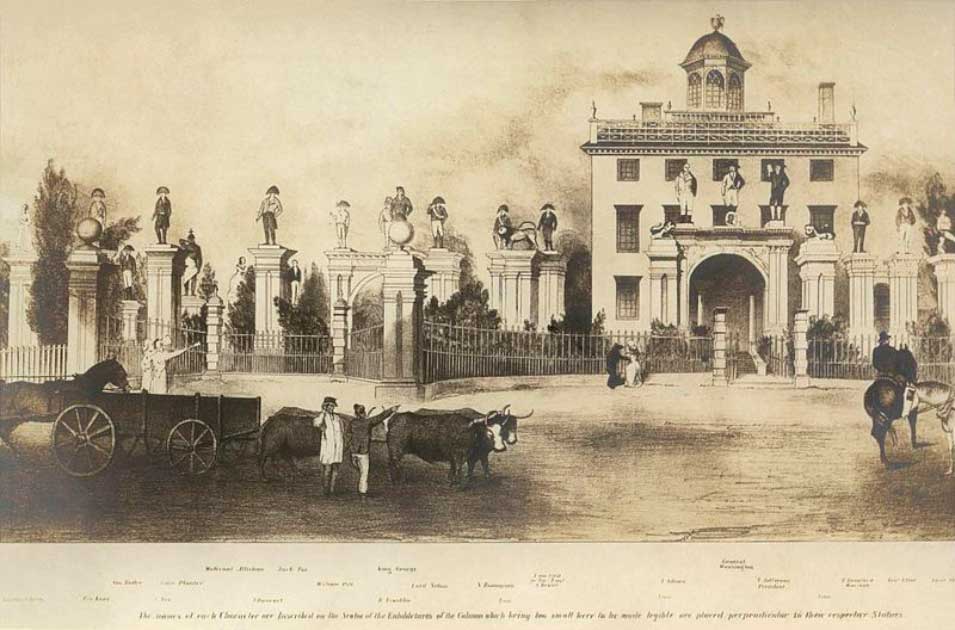What drives the world’s most successful business people? Is it greed? Ambition? Or ego? Perhaps a mix of all three? In the strange case of Timothy Dexter, a man who was raised dirt poor but somehow wound up one of the richest men in post-revolutionary America, it was the third option.
His ego and need for the approval of others were such that he faked his death just to see who would turn up at his funeral. Here is his peculiar story.
Early Life
Timothy Dexter was born in Malden, Massachusetts on January 22nd, 1747. He was from a family of Irish immigrants who had moved to the new world the century before. His family was poor and by the time he was 8 years old, he was working as a farm laborer. He never finished his schooling.
At 14 he left the farm behind and went to Charlestown, Mass to work as a tanner’s apprentice. He stayed an apprentice for seven years and upon finishing his apprenticeship was given a new suit of clothes by his employer called a “freedom suit”.
Dexter planned on starting his own business as a tanner. He may have come from nothing but he had aspirations, he was going to make a name for himself. The only problem was he had no home, no money, and no real prospects.
His solution was to sell his freedom suit for eight dollars and 20 cents. He used this money to move to Newburyport (a seaside town and hub for artisans and tradesmen) in 1767. Within a year he owned land and had married.
A Profitable Marriage
On the eve of the Boston Tea party, Dexter met Elizabeth Frothingham, the widow of one of Dexter’s former associates. Her husband had owned a successful leather shop and had left her a large estate, a good amount of money, and the shop. Dexter wasted little time in marrying her, happily ignoring the fact she was 8 years older than him and had four children.

They moved to her large estate in Boston and Dexter set up shop in her basement, selling moosehide trousers, gloves, hides, and whale blubber. Elizabeth also went into business and opened a shop that sold notions.
Dexter worked diligently and by the end of the American Revolution he had saved up several thousand dollars. But he wasn’t happy. His wealthy neighbors had much more than him. Dexter, who had come from nothing, wouldn’t be content until he was one of the elites.
He persistently asked the great and good of Boston for investment opportunities that would make him rich. The elites, who saw him as nothing more than a country bumpkin who didn’t know his place, convinced him to invest all his money in the recently issued Continental dollar bills.
They had done this because they believed the Continental dollar bill to be worthless. And for a time it was. By all rights, Dexter should have been left destitute. But then, at the end of the war, Congress made good on the currency and its value skyrocketed. Dexter went from being a comfortably wealthy man to a very rich man. Some people would say his investment had been shrewd. Many more say it was lucky.
Strange Business Dealings
Dexter’s newfound wealth failed to satiate his hunger, however. What he wanted was the respect of his peers. He believed the only way to do this was by making even more money. This he thought was the only way he could prove to the snobbish elites that he was one of them, not a simple country boy.
He built two ships, the Mehitabel and Congress. He then approached the same elites he wished to join and asked them for yet more business advice. It is said that annoyed by his poor manner and lack of class they once again tried to scupper him by giving him poor business advice.
The thing was, whatever they suggested, he was successful. As he became more successful, he became more bold and his investments more improbable. First, they told him to send bed warmers (pans used to hear cold beds during New England’s freezing winters) to the tropical West Indies. His ship’s captain sold them as ladles and Dexter made a tidy profit.
Next, they told him to send wool mittens to the West Indies. Asian merchants who were passing through bought them up for export to freezing Siberia and Dexter made a killing. One year Newburyport had a problem with stray cats. The Town meeting held a vote on whether or not to exterminate the cats but the motion failed. The next day Dexter put an ad in the local paper promising to buy stray cats and treat them well.

He put all the stray cats on a boat to the Caribbean where he sold them. It turned out warehouses there were dealing with rat infestations and were more than happy to pay a premium for cats.
With each of his successes, his neighbors became more infuriated. Eventually, they suggested he buy up a large quantity of coal and sell it to Newcastle (where the coal had more than likely come from in the first place). At the time Newcastle was the mining center of England. Dexter might as well try to sell ice to the Eskimos. Everyone knew this was a fool’s errand. Everyone but Dexter.
Dexter promptly spent a fortune on coal and shipped it to Newcastle. While his shipment was traveling across the Atlantic the miners in Newcastle went on strike. By the time the shipment arrived the Brits were desperate for coal and happy to pay a premium for it.
All this success sadly made Dexter no happier. The elites he was so desperate to impress still viewed him as a distasteful and grotesquely lucky idiot. His unhappiness and need for approval led to problems at home. His wife berated him constantly for his wandering eye and habit of drinking too much. He in turn called her a ghost and refused to accept that she was still alive.
Eventually, Dexter decided the only way he was going to get the respect he deserved was if he had a title. So he moved to Chester and insisted that people called him the Earl of Chester. Any child who called him Lord Chester would receive a quarter, an adult, dinner, and drinks.
A Staged Funeral
This last strategy worked to an extent. Dexter finally found himself in the kind of company he had always longed for. But the chip on his shoulder told him these people were just sycophants and phonies who were after his money. Dexter wanted to know who his real friends were.
So he did the only sensible thing, he staged his own funeral. It was a grand ceremony and over 3,000 people attended. Dexter’s wife and family had been bribed and given strict instructions on how to act.

This is when Dexter suffered his final humiliation. Shortly after the ceremony, his ruse was revealed when he was found in the kitchen beating his wife with a cane. Instead of playing the mourning widow he had found her happily laughing with the guests. No one had been particularly sad to see the back of him. The incident cemented Dexter’s reputation as a buffoon who had gotten rich through luck rather than brains.
Conclusion
Dexter died not long after his funeral on 26 October 1806, he was 59 years old. Desperate to not be forgotten shortly before his death he released a book, A Pickle for the Knowing Ones, or Plain Truths in a Homespun Dress. Initially, he gave it away for free but the book ended up selling 8 editions, despite the fact it was so poorly written that sections are barely coherent.
Whether or not Dexter was a fool who got lucky or a shrewd businessman skilled at playing the fool is up in the air. No one knows for sure. What we do know is that he was a man with a chip on his shoulder. A man who only wanted to be accepted by upper society but never was.
Dexter finally received the notoriety he had always wanted in death. Whether he would be pleased or disappointed with how he is remembered today is anyone’s guess.
Top Image: Strong hat game: Lord Timothy Dexter out about town. Source: Internet Archive Book Images / Public Domain.